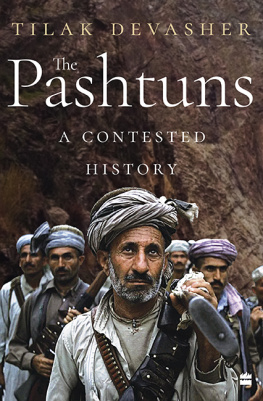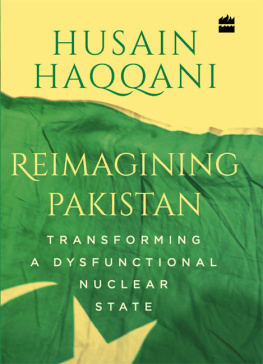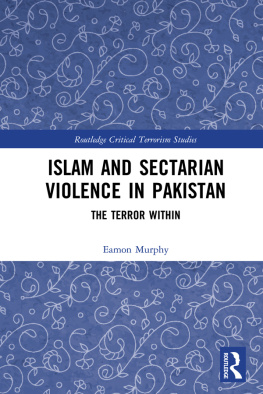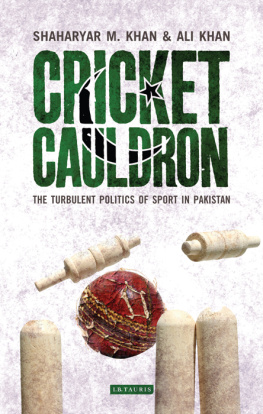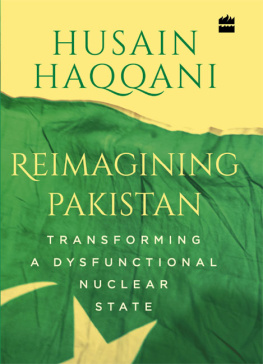Table of Contents
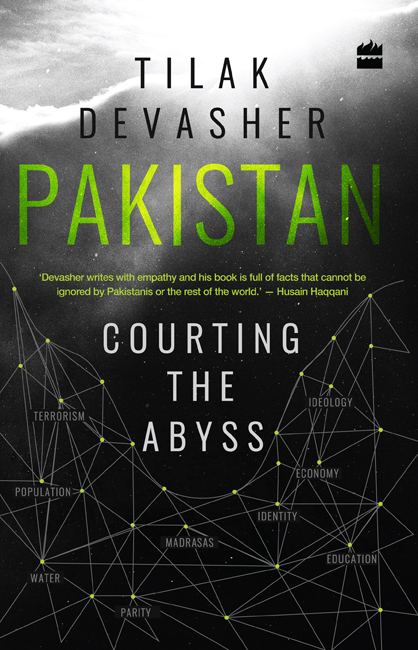
PAKISTAN
Courting the Abyss
TILAK DEVASHER

To the memory of
my mother
Late Smt Kantaa Devasher,
my father
Late Air Vice Marshal C.G. Devasher PVSM, AVSM,
and my brother
Late Shri Vijay (Duke) Devasher, IAS
Press on Regardless
Contents
M Y fascination with Pakistan is not because I belong to a Partition family (though my wifes family does); it is not even because of being a Punjabi. My interest in Pakistan was first aroused when, as a child, I used to hear stories from my late father, an air force officer, about two Pakistan air force officers. In undivided India they had been his flight commanders in the Royal Indian Air Force. They and my father had fought in World War II together, flying Hurricanes and Spitfires over Burma and also after the war. Both these officers later went on to head the Pakistan Air Force. Though still in my teens, the Indo-Pak wars of 1965 and 1971 further heightened my interest in Pakistan. In college and university I studied the history of the freedom movement and the Partition of India. And I was hooked.
My curiosity grew at every twist and turn in Pakistan. The sophistication of Pakistani plays like Dhoop Kinare and Tanhaiyaan that two generations of Indians still rave about, the excellence of the Pakistani cricket teams and the brilliance of its squash players contrasted harshly with the trajectory of its political, economic and religious development. The difference between the democratic journey of India and the military dictatorships in Pakistan provoked questions as to why the two countries have developed so differently. The growth of intolerance and radicalization on the one hand and terrorism directed against India resulting in the deaths of hundreds of innocent Indian civilians on the other lent an ominous dimension to my questions. I was determined to understand what made Pakistan such a violent and inhospitable place, on the verge of being declared a terrorist state and the worst nuclear proliferator in the world. In short, why was Pakistan courting the abyss?
Two couplets by Pakistans greatest poets, Faiz Ahmed Faiz and Habib Jalib, helped me narrow my quest. While the couplet from Faiz expressed anguish at the circumstances of the birth of Pakistan, Jalibs articulated what the rulers of Pakistan had done to the country. Combined, the two couplets expressed the ongoing tragedy of Pakistan.
Faiz: Subh-e-Azadi/Dawn of Freedom:
Ye daagh daagh ujala, ye shab-guzida sehr
Woh intezar tha jiska, ye woh sehr to nahin
This tainted light, this night-bitten dawn
This is not the dawn we waited for
Jalib on the army crackdown in East Pakistan:
Mohabbat goliyon se bo rahe ho, Watan ka chehra khoon se dho rahe ho
Gumaan tumko ke raasta kat raha hei, Yaqeen mujhko ke manzil kho rahe ho.
You are sowing love through violence, smearing the face of the nation in blood;
You think your journey is being completed, I am certain you are losing your destiny.
Being a student of history, I was not satisfied with just skimming the surface, trying to understand Pakistan through current events and reporting. I wanted to dig deeper to know more about how Pakistan was created and the impact of those developments on the trajectory that Pakistan had adopted. I also wanted to understand what was behind the faade of a hostile neighbour, what were the real issues that plagued the country and its people. So much was being written on exciting issues like the Pakistan Army, the nuclear programme, terrorism, and, of course, Indo-Pak relations, that scant attention seems to have been paid to what was happening inside the country. Seemingly boring issues like identity, the situation in the provinces, water, education, economy, population, etc., seem to have been largely ignored, though they are critical to the survival and understanding of any country. I, therefore, decided to write a holistic book on Pakistan that would encompass the exciting issues and the boring ones, to analyse why Pakistan was hurtling towards the abyss.
This is a book about Pakistan. It is not about a comparison between India and Pakistan. In fact, I have tried to minimize comparisons with India as much as possible. It is equally not about IndoPak relations. There is already vast literature on the subject. Of course, no book on Pakistan is complete without India because Pakistans perception of India is central to its identity, its ethos, its world view and policies. Thus, there is a separate chapter on India and India does figure in various other chapters too. But, the book is essentially about Pakistan.

I would like to express my gratitude to a few people who in their own ways have helped me in the writing of this book.
To my wife Anjali for her patience in allowing me to spend hours, days and months in my bat-cave (my study) reading, researching and writing this book instead of doing what normal civil servants do take up a post-retirement job.
To my son for his wit and amazing sense of humour and my daughter-in-law for her courage and quiet strength in the face of life-changing adversity, both of whom helped me retain a sense of proportion.
To my daughter, for suggesting and digging up material that I was unable to locate, for being my staunchest critic as also a pillar of strength and with whom I had engaging discussions on several chapters of the book.
To Dr Ajai Sahni for encouraging me to write a book in the first place and for accessing some of the comparative indices.
To my editors Karthika V.K. and Antony Thomas at HarperCollins for all their effort in bringing out this book.
Despite the help, all the shortcoming and errors in this book are mine.
T HE contrast between the two flights could not have been sharper.
When Mohammad Ali Jinnah (henceforth Jinnah) boarded the viceroys shining silver Dakota from Delhi to Karachi on 7 August 1947, he looked back towards the city and said: I suppose this is the last time Ill be looking at Delhi.
A little over a year later, on 11 September 1948, Jinnah, weighing barely 70 pounds and suffering from consumption, compounded by cancer of the lungs, was carried on a stretcher aboard the governor generals Viking for the flight from Quetta to Karachi.
The poignancy and the depressing contrast between the two journeys symbolically captures the tragedy of Pakistan from the blood-soaked yet enthusiastic creation in 1947 to the present-day exhaustion and gloom-and-doom scenarios. It is this journey from Faizs tainted dawn to Jalibs tragic destiny that is the subject matter of this book.

The book aims to explain how this has happened and how Pakistan is courting the abyss. It traces Pakistans development not only from 1947, when the country came into being, but also looks at the foundations the Pakistan movement; the impact that the British replacing the Mughals had on the Muslim psyche; and the role the colonial power played in crystallizing a separate Muslim identity. It looks at the internal and external dynamics of Pakistan to understand why it is careering towards the abyss. In that sense it is not a conventional book on Pakistan. It does not trace the history of Pakistan; neither does it detail developments chronologically. It is more in the nature of an interpretative study, looking at various elements of Pakistans history and development to explain why Pakistan is such a persistently troubled state and why, without serious corrective actions, a tragic destiny looms.


